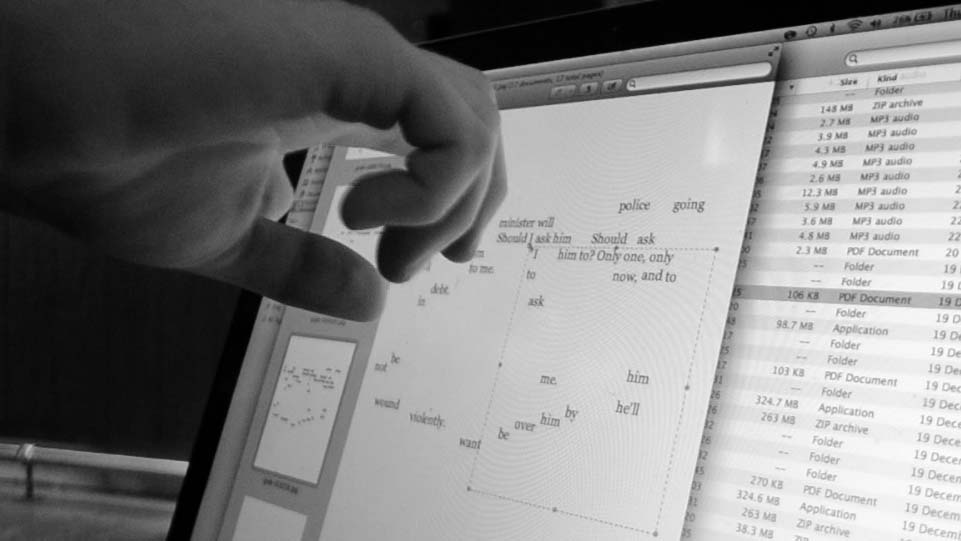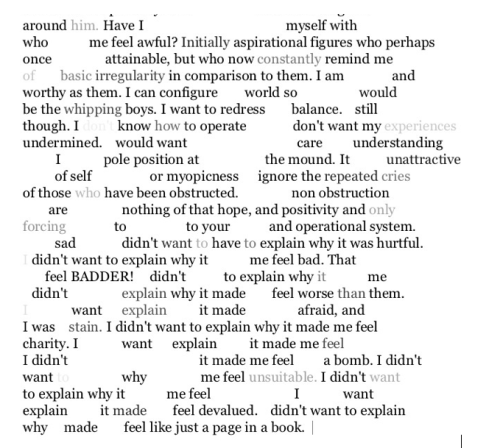
- Collaboration with Lyricist
Legitmates being emotional and writing emotionally...
I collaborated with my friend Harry because of his creative background as a writer/lyricist. He is also a musician with the band Adult Jazz and someone who's writing is influenced and inspired by creative typographic/text-based experiments.
His writing background made him one of the more confident participants and our conversation revolved around how the unique style he has cultivated, worked in relation to the different interactions.
A feature of his writing process is what he describes as using the two percent voice
or extreme voice
. He explained that this is the voice you think about things two
percent of the time
, which is a highly emotive style, similar in nature to a rant. With
minimal redrafting, certain lines are then extracted to form the lyrics of a song.
This style was explored using the programs and encompasses personal and creative forms of writing. The immediate interactions (FALL and FADE) were favoured the most, which among other things, made powerful dents in the emotionally charged writing. The captures of the deconstructed texts were referred to throughout our conversation, with extracts occasionally being read out loud in order to help contemplate and understand their meaning and how effectively the interactions work.
Main Points
The visual processes of FALL can be used informally to reimagine and rephrase new or familiar work, such as poetry and lyrics. Writers can use the software to experiment with their prose and wording:
"There were lots of different arrangements of words from these lyrics that I was very familiar with and it breathed a new life in to them."
Similarly, the FALL program can encourage the writer to use more descriptive language because of how the interaction works:
"You're keen to write interesting words because you want them to fall, and end up next to other interesting words."
This could help with the creative process of writers or be used in the context of education.
With the FADE program, writing whilst the words disappear removes the user from the constraint of perfection and craft. This could be used to aid the stream of consciousness and detach the writer from the necessity of crafting a perfect piece of text:
"I did think it was more fun to write with the interaction on because you had to be really focused. I wasn't looking to create a whole piece"
Similarly, the disappearing words detach the user from feeling self-conscious. It can detach the writer from caring about how they sound which could be beneficial for expression.
"It felt more like speaking than writing usually does because it goes..."
The other feature of the FADE program is it removes words to culminate in a disrupted and partially concealed text. This was described as protective. The visual outcomes of the process can soften the harsh reality, which is beneficial for re-reading and sharing because it allows for vulnerability without complete disclosure.
"This kind of thing is the real protection from the ultimate reality of what you wrote, which might be quite real. It's protective and defensive"
The significance of this in relation to the extreme voice was also commented on, stating that the use
of the software Legitimates being emotional and writing emotionally.
User testing has helped enrich the research in the context of writing practices and personal forms writing whilst demonstrating how writers can use features intuitively according to their own unique style and voice.
Thanks Harry
Are you a writer who is curious about trying out the software? If so, I would be very excited to hear from you:


